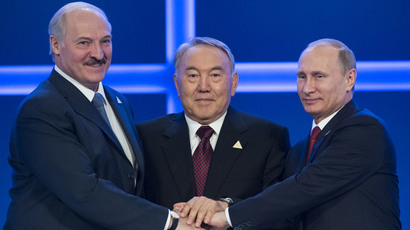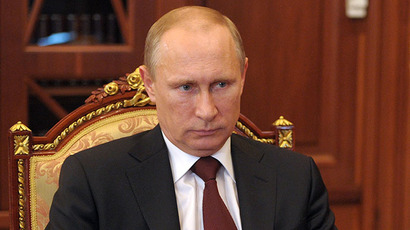Ukraine and EU sign free trade zone deal
Ukraine has signed the economic part of the Association Agreement with the EU, with Georgia and Moldova also joining the pact, even though big economic risks lie ahead.
The signing of the economic part of the agreement comes after 8 months of violent unrest in Ukraine, which broke out in Kiev and spread across the country in November after then-President Viktor Yanukovich decided to reject the trade agreement in favor of trilateral talks.
The document contains 31 signatures - Ukraine, all 28 EU member states, as well as that of the President of the European Council Herman Van Rompuy, and European Commission President Jose Manuel Barroso. The agreement will only come into force when it is ratified by every national parliament in the EU. It is expected that the ratification process will be complete by this fall.
Georgia and Moldova also signed both political and economic parts of the Association Agreement. Ukraine signed a political part of the agreement in March, shortly after Crimea rejoined Russia.
"By signing the association agreement, Ukraine, like European nation, which shares the same rules of law, stresses its sovereign choice to become a member of the EU Association Agreement in the future," said Ukraine's President Poroshenko before the signing ceremony. The Ukrainian President sees the trade document as a stepping stone to eventual EU statehood.

Friday signing the Free Trade Agreement will open up trade barriers between the former Soviet states, but doesn’t guarantee them EU membership, a main goal of the three governments.
“It is their sovereign right, but the Russian Federation will have to take measures in case it negatively effects the local market,” Dmitry Peskov, Putin’s spokesperson said, commenting on the agreements signed between the EU and Ukraine, Georgia and Moldova.
Russia has warned these "measures" could include $500 billion in lost trade and possible bans on Ukrainian imports.
“There is no economic growth to be had by suddenly having western European goods dumped at low cost on your marketplace,” Patrick Young, an expert on emerging markets, told RT.
In order to fully implement the free trade zone, it could cost Ukraine’s already fragile economy an additional $104 billion, according to a previous estimate by Yanukovich. This will include adopting hundreds of new trade laws and thousands of new laws to comply with EU standards.
In 2013, EU exports to Ukraine were worth $33 billion (23.9 billion euro), dominated by industrial equipment, chemicals, and manufactured goods.
Ukraine exported 13.8 billion euro worth of goods to the EU, mostly materials like iron, steel, and minerals. Agricultural and food products are also substantial exports.

The Association Agreement and Deep and Comprehensive Free Trade Area (DCFTA) will replace the current Partnership and Cooperation Agreement Ukraine signed with the EU in 1998.
Eastern Ukraine, which rejects the new Ukrainian government's authority, is skeptical of Kiev’s European ambition, as is the EU itself.
“EU is not ready to integrate at this stage a country like Ukraine,” Jose Barroso, President of the European Commission said before the talks.
Brussels started the Eastern Partnership initiative to incorporate six former Soviet Republics into the EU free trade zone. Ukraine, Moldova, and Georgia have followed Poland’s example, whereas Armenia, Belarus, and Azerbaijan are likely to opt for closer trade links with Russia.
Trilateral trade talks between the EU, Russia, and Ukraine will take place on July 3-4. Russia has made it very clear that by signing the trade agreement Ukraine can no longer enter the Eurasian Customs Union, which already includes Belarus and Kazakhstan.














